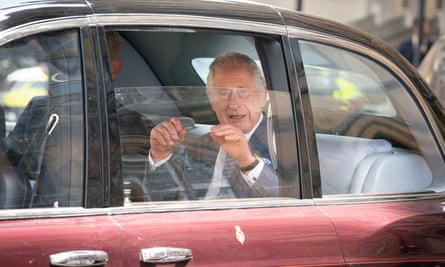The BBC has allowed Buckingham Palace to veto what footage it can use in its coronation coverage, raising questions about the national broadcaster’s impartiality in relation to the monarchy.
In recent days the BBC has submitted material to the palace for approval in royal-themed programming, only for Buckingham Palace to declare certain pieces could not be used, according to individuals with knowledge of the situation.
“The balance of the power is a little bit more with the royal household than the BBC at the moment,” said one source at the broadcaster, who said negotiations over the terms of the BBC’s coronation coverage were still ongoing just hours before proceedings were due to begin.
The BBC is leading global coverage of the event, with its footage of King Charles in Westminster Abbey to be shared with other news channels around the world. This has led to fears at rival broadcasters that they have to trust the BBC’s editorial calls over what can be shown during the formal church service.
A BBC spokesperson said: “We are focused on delivering great coverage and don’t recognise any characterisation that suggests we ever compromise our editorial integrity on any of our output.”
The BBC’s coronation coverage is being run by Claire Popplewell, who oversees royal events for the corporation. Earlier this year she was made a commander of the Royal Victorian Order by the king in recognition of her work producing the BBC’s coverage of his mother’s platinum jubilee.
Membership of the Royal Victorian Order is given to those who have served the monarch. Unlike most other honours, which are awarded on the recommendation of the government, recipients of this award are personally selected by the sovereign.
Popplewell, who was described by a BBC source as “currently one of the most powerful people within the BBC”, helps manage the broadcaster’s relationship with the palace.
To confuse matters, she is employed by the corporation’s for-profit BBC Studios commercial arm. This had led to a split between the BBC’s public service news division, which has a more stringent editorial code, and the BBC Studios team who are producing the coverage that will go out on BBC One.
The BBC spokesperson said: “The programmes are produced by BBC Studios and commissioned by the BBC and there are many individuals involved in the conversations and decisions about what content makes the final broadcast programmes.”
There are already indications of the royal household choosing what can be seen by the public. King Charles has vetoed the televising of his anointment by the archbishop of Canterbury, according to the Times. This means the public will not be able to watch as holy oil from Jerusalem is poured from a golden container shaped like an eagle into a 12th century “coronation spoon” before being spread on Charles’s head, breast and hands.

This is not the first time the BBC has allowed the palace to have control over royal footage. The Guardian has previously revealed how the palace vetoed particular pieces of footage from Queen Elizabeth II’s memorial services, banning them from being reused in news reports and social media clips.
Royal staff had a WhatsApp group during the proceedings in which senior executives from the BBC, ITV and Sky News were told which footage could be used. A member of the royal household would send a message every five minutes, either approving or refusing the use of the previous block of video.
After the funeral had finished the broadcasters were allowed to submit an hour-long tape of highlights which they could reuse in future, with use of any other material requiring signoff from the palace.
The veteran broadcaster David Dimbleby, who took part in the BBC’s coverage of the queen’s funeral, later confirmed the story. In an appearance at the Henley literary festival he described being surprised by the “degree of control” exercised by Buckingham Palace over the footage of the funeral.
“There was this complete list of things that no broadcaster could show because the copyright belongs to Buckingham Palace. I think that’s wrong, just wrong. It’s just interesting how tightly controlled monarchy is.”
He also suggested that topics such as the royals’ tax affairs are “never touched by the BBC because I think they feel their viewers will not like it”.
The National Union of Journalists this week passed a motion raising concerns about the palace’s veto over royal footage. They express concerns “that a public event, paid for by the people and televised for them to be able to pay their respects should be censored in even a small way”.
It came as the BBC found itself in a last-minute standoff over the “restricting” of British news outlets’ ability to access footage by charging high fees.
The corporation’s decision to charge media companies for what the industry calls pool footage was decried as “perverse” by its rivals, who said it would stop the public from witnessing key moments of the historic day.
A statement from the newspaper industry body News Media Association said: “Given the historic significance of the occasion, all efforts should have been made by the BBC to ensure that the footage, which is created using licence fee-payer money, is distributed as widely as possible to allow UK citizens to witness this event, and the BBC has not fulfilled this obligation.
“The decision to charge UK media companies an excessive commercial fee (with no visibility of true costs) seems perverse when the BBC is allowing foreign publishers and broadcasters the same footage for free.”

